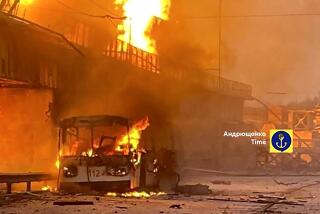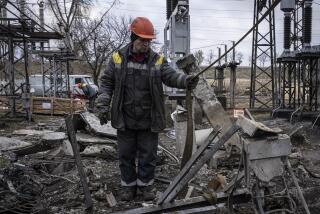Soviets Tunneling Beneath Reactor : Official Hints at Meltdown Into Earth; Number of Evacuees Reaches 84,000
- Share via
MOSCOW — Workers dug below the smoldering Chernobyl reactor Thursday in what a leading Soviet scientist termed a battle against an unprecedented nuclear accident.
Remarks by Yevgeny P. Velikhov, vice president of the Academy of Sciences and a personal adviser to Soviet leader Mikhail S. Gorbachev, indicated that the reactor core may be melting.
His words seemed to support theories by some experts in the West who say that the Soviets may be facing the so-called China Syndrome--a major meltdown that sinks through the concrete floor of the plant and into the Earth’s outer crust and water table.
In other developments, officials said that 84,000 people--rather than 49,000 as previously reported--have been evacuated in two stages from a “danger zone” around the stricken reactor.
Ice Cream Sales Banned
Hundreds of people left Kiev, where outdoor sales of ice cream and juices were banned and officials considered whether to close schools early because of Chernobyl emissions that raised radiation levels in the Ukrainian capital, 60 miles south of the reactor site.
Velikhov, in an interview published in Pravda, the Communist Party daily, gave the most pessimistic appraisal by any Soviet official since the Chernobyl disaster occurred April 26.
“As for the reactor, we have mounted an offensive against it,” he added. “The work proceeds not only above, but beneath it as well. Our task is to neutralize it completely, to ‘bury’ it, as we say. . . .
“No one has ever encountered this sort of an accident, and the unusual nature of the situation demands solutions that specialists never had to deal with,” he added.
Velikhov, 50, a specialist in nuclear and plasma physics, is a member of the government commission formed to deal with and find the causes of the Chernobyl disaster.
Another indication of the grave dimensions of the accident came from West Germany, where a nuclear industry spokesman said that he was approached by Soviet diplomats seeking expert help in coping with a “hot molten mass.”
The spokesman, Director Thomas Roser of the German Atom Forum, said Soviet diplomats asked him to locate specialists who could provide urgent information on “how to handle something extremely hot that may have melted through the nuclear plant floor.”
‘Extremely Bad News’
The Soviets did not furnish exact details about what was happening at Chernobyl, Roser said, but he described as “extremely bad news” what Western scientists see as the increasing likelihood that a meltdown has occurred.
In addition to publishing the Velikhov interview, Pravda reported that helicopters were still dropping tons of sand, clay and lead on the Chernobyl reactor in hopes of snuffing out the fire that has been burning for nearly two weeks.
“Regrettably, the struggle . . . is not finished,” the newspaper said. “It is continuing, and thousands of people are conducting it with even greater energy than yesterday.” A senior Western diplomat analyzed the official reports on the accident as a sign of major concern.
“When they say the situation remains complex, that means to me they still have a helluva problem,” the diplomat said. He asked that his name and country be withheld so he could speak with greater candor.
Hans Blix, director general of the International Atomic Energy Agency, told reporters that he saw “a little smoke” emerging from the reactor as he and two aides flew over the Chernobyl site in a helicopter.
Specialists are working hard to contain the emissions, he said, adding, “I hope they will continue to stabilize the situation.” He has scheduled a news conference in Moscow today to discuss his visit here.
Meantime, Ukrainian Premier Alexander P. Lyashko said that the stubborn fire in the reactor has “practically stopped” and that radiation levels around it are “stable” with a downward trend.
The temperature in the reactor, he said, has dropped to 300 degrees Centigrade which he said was an indication that the fire was almost out.
Lyashko made the report to the first group of foreign correspondents allowed to visit Kiev since the government announced the Chernobyl accident on April 28.
He said that officials in Moscow were not told about the full gravity of the accident until two days after the explosion at Chernobyl.
“It was constantly developing,” Lyashko explained. “It was a very difficult situation. . . . The measurements at first showed there was nothing to fear.” After an initial evacuation on April 28, he said, officials decided to double the “danger zone” and evacuate 30,000 more people from the city of Chernobyl, about 10 miles from the stricken plant.
This second evacuation was ordered May 2 after a visit to the area by Premier Nikolai I. Ryzhkov and Yegor K. Ligachev, a senior Politburo member. It was not completed until Tuesday, Lyashko said.
Lyashko said the 204 people officially reported injured were all workers at the power station. The Kremlin has listed the death toll as two, but the Yugoslav Tanjug news agency said in a report from Moscow that a third person has died in a Kiev hospital.
A pool correspondent for the Moscow press corps, Charles Bremner of Reuters news agency, said that people in Kiev were walking in the warm spring evening as trucks regularly flushed the streets as a precautionary measure against radioactivity.
In addition, Kiev imposed stringent inspection measures and halted the outdoor sale of ice cream and juice. All travelers departing by air, bus or rail were checked for radioactivity, and city residents were urged to get rid of dust in their apartments, wash their hair daily and keep their windows closed.
Despite official assurances, the official news agency Tass acknowledged, there was a feeling of “anxiety” for the welfare of children in Kiev.
Long lines formed at airline and railway ticket offices, and hundreds of parents and children left the city for unscheduled vacations in Moscow and elsewhere. Tass said that “dozens” of extra trains and some additional airplane flights were added to handle the exodus.
An Intourist guide who met the first group of foreign correspondents said that residents of Kiev heard about the Chernobyl accident on Sunday, a day before it was disclosed by the government.
“People were worried on the first day. . . . Now people are calm,” she told the group. “Yes, people thought in the first days that the authorities did not act fast enough. Now we have all the information.”
Trains arriving in Moscow from Kiev on Thursday morning were full of small children, and some of their parents acknowledged that they had left the Ukrainian capital out of concern for the health of their youngsters. Others told reporters they had decided to come to Moscow on vacation--a rare event in springtime when trees and blossoms in the Ukraine are in full bloom.
In another development, the Politburo raised salaries for workers in the Chernobyl region and promised a lifetime pension at full pay for anyone who suffered disabling injuries because of the accident.
It authorized lump-sum payments to persons who were evacuated, as well as funds for new clothes, and promised special pensions for those hurt while fighting the fire at the plant.
The Politburo actions, reported on the evening television news program, did not offer condolences to the families of those killed or injured in the disaster.
So far, Soviet leader Gorbachev has not said a word about Chernobyl. Rather, he has been shown conducting Kremlin business as usual, greeting foreign leaders and dispatching renewed proposals for a ban on nuclear tests.
Western experts still unsure if meltdown occurred. Page 20.
More to Read
Sign up for Essential California
The most important California stories and recommendations in your inbox every morning.
You may occasionally receive promotional content from the Los Angeles Times.













